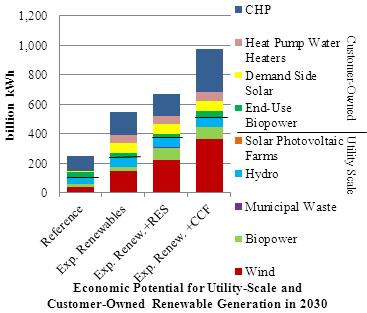
After completing “Energy Efficiency in the South,” the Climate & Energy Policy Lab continued its partnership with Duke University to explore the South’s potential of renewable energies. The result was a report on Renewable Energy in the South. Our research focused on a portfolio of renewable resources (utility-scale and customer-owned), and evaluated the barriers, drivers, and policies that could affect the South reaching this potential. The types of renewable energy include: wind power, bio power, municipal waste, hydropower, solar power and thermal energy, heat pump water heaters, and combined heat and power.
We explored the economic potentials of both the utility-scale and customer-owned renewables by applying NEMS modeling across the multi-state region for a broad set of renewable resources. Besides the economic tests, the renewable potentials were examined in two possible policy scenarios: Renewable Energy Standard (RES) and Carbon Constrained Future (CCF). The major findings show that the region could economically supply a large portion of its future electricity needs from utility-scale renewables (511 billion kWh in 2030 in the Expanded Renewables + CCF scenario) under realistic technology expansion and policy scenarios. The growth of customer-owned renewable generation could nearly match that of utility-scale renewable generation (464 billion kWh in 2030 in the Expanded Renewables + CCF scenario) by 2030.
Resources:
- Executive Summary of Renewable Energy in the South
- Full Report: Renewable Energy in the South
- Energy Policy Journal Article: Brown, Marilyn A., Etan Gumerman, Xiaojing Sun, Kenneth Sercy, and Gyungwon Kim. 2012. "Myths and Facts about Clean Electricity in the U.S. South," Energy Policy 40: 231-241.
- The Energy, Kresge, and Turner Foundations
Researchers:
- Marilyn A. Brown: marilyn.brown@pubpolicy.gatech.edu
- Etan Gumerman: etan.gumerman@duke.edu
- Youngsun Baek: baeky@ornl.gov
- Yu Wang: yu.wang@gatech.edu
- Joy Wang: wang.joy@gatech.edu
- Cullen Morris: cullen.morris@duke.edu
